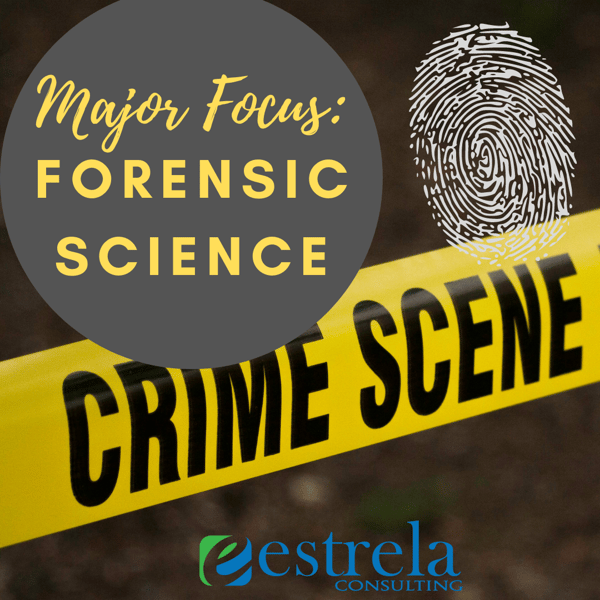
Do TV shows like CSI and Bones have you on the edge of your seat? Are you intrigued by blood spatter? Does hunting for spent shell casings sound like an exciting endeavor? If yes, then a career in forensic science might be for you!

Forensic scientists are some of the most important individuals in our justice system. Simply put, their job is to find the truth through objective, scientific analysis. Sometimes this involves helping identify criminals and analyzing evidence against them. Other times, their work is found on the civil side of things settling disputes or helping to verify information. But no matter the setting or scenario, forensic scientists are always on a mission of truth using scientific knowledge as their guide.
INDUSTRY OUTLOOK
The great news is that individuals considering a career in forensic science will most likely have jobs available to them in the coming years. According to the US Bureau of Labor Statistics, jobs in this field will grow 16% from 2020 to 2030, which is much faster than the average for all occupations. With advances in science and technology, it’s projected there will be additional need for forensic scientists who can operate and relay information learned from these advancements.
The average median salary for forensic scientists is $60,590 per year or $29.13 per hour. It’s important to note that depending on the setting in which they work, some forensic scientists are paid a yearly salary whereas others are paid an hourly wage. Likewise, some may work a set schedule each week while others end up working extended and/or unusual hours in order to meet the demands of their job.
HIGH SCHOOL PREPARATION
Forensic scientists greatly rely on math and science in their daily work, so it’s important that you are comfortable with both of these subject areas. Some high schools offer courses in forensic science. If that is the case at your high school, taking the class as a science elective your junior or senior year will allow you to see if this area is a good fit for you before you begin the process of applying to colleges. If your high school doesn’t offer this course, take a look to see if there are any forensic science summer opportunities offered in your area such as this one or this one. Forensic scientists oftentimes have the job of testifying in court about investigative or analytical methods or findings, so making efforts to engage in public speaking in high school will pay off big time in the future. Consider joining the debate team or mock trial to hone your skills in this area.
FORENSIC SCIENCE CURRICULUM
The most comprehensive and rigorous Forensic Science undergraduate programs are accredited by the Forensic Science Education Programs Accreditation Commission (FEPAC). This accreditation means that the program is of high quality and provides the scientifically rigorous curriculum and instruction necessary to find a career in the field after graduation. In addition to general education courses, the curriculum of undergraduate Forensic Science programs typically entails some math and science courses as well as courses that are specialized to the field. For science - anatomy, chemistry, and physics are almost always required. Math requirements vary depending on the program but usually include some type of statistics and basic calculus. The hallmark of these programs is the offering of specialized courses teaching advanced skills used on the job by forensic scientists. Some of the most common ones are Crime Scene Investigation, Trace Evidence Analysis, and Forensic DNA Analysis. Traditionally, students take a few specialized courses during their first year or two, but most won’t be taken until the third or fourth year of the program.
PROGRAMS ON OUR RADAR
- Liberty University. FEPAC accredited. One highlight of the Forensic Science program at Liberty University is courses and research being led by professors who are professionals in the field of forensic science. Some have even worked on high profile murder and missing person cases. Another standout feature is the Washington D.C. internship opportunities available to students with the FBI, NCIS, and Congress. And if you are someone who’s discovered your passion for forensic science partway through your college years, you may want to consider transferring to Liberty. They are known for their generous transfer credit policy, and their forensic science degree will allow for up to 75% of the credits to have been earned elsewhere.
- West Virginia University. FEPAC accredited. At West Virginia University, Forensic Science students can choose from three majors: Forensic Biology, Forensic Chemistry, and Forensic Examiner. Within each of these majors, students have their pick of an extensive selection of specialized courses. WVU also happens to be home to the most extensive crime scene training complex in the country. The complex provides students a ton of hands-on learning with four different crime scene houses, unique outdoor learning areas, a ballistics test center, and a vehicle processing garage. Students also have the opportunity to live in the Forensic Living-Learning Community where they will bond with fellow Forensic Science students and engage with faculty in the Forensic and Investigative Science department.
- Bowling Green State University. FEPAC accredited. At Bowling Green State University, the Forensic Science program gives students the choice to specialize in Forensic Biology, Forensic Chemistry, or Forensic Examination. One very unique aspect of this program is the location of the Ohio Bureau of Criminal Investigation (BCI) crime laboratory and investigation facility directly on campus. Through a partnership with the BCI, the Center for the Future of Forensic Science was established in 2014, giving BGSU students the opportunity to be taught by BCI scientists and crime scene agents. Students are also provided with hands-on experiences, further developing skills expected of prospective job candidates. Additionally, students have the opportunity to live in the Forensic Science Learning Community where they reside with other Forensic Science students and have unique opportunities for exploration outside of the classroom.


